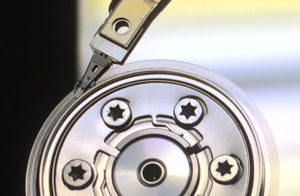Astronauts need to store a lot of data. Do they use hard drives, solid-state drives (SSD), or some other technology?
The answer: Hard drives can function in outer space, although solid-state storage may be a more appropriate choice for modern astronauts. Here’s an overview.
Altitude can affect hard drive reliability, but in space, it’s not a huge concern.
As we’ve discussed in other articles, conventional hard drives are more likely to fail at high altitudes. That’s why most consumer HDDs have strict language in their warranties that warn consumers to operate their devices at altitudes of less than 10,000 feet.

The platters and actuator heads of a hard drive.
Hard drives contain read/write heads, which float above a series of platters. The platters have a magnetic coating that stores the user’s data. The read/write heads never come into direct contact with the platters (unless something goes wrong; read more about hard drive head crashes).
The rotation of the platters creates a thin cushion of air, and the read/write heads float on that cushion during operation. Atmospheric issues can affect that air cushion.
But fortunately, this isn’t a big deal in the crewed areas of spacecraft. Those areas are pressurized, and hard drives can operate more-or-less normally.
Does gravity affect hard drive operation?
Gravity (and the lack thereof) is certainly a consideration for practically everything space-related, but it doesn’t affect hard drives significantly. The movement of the platters is powered by a motor, and hard drive motors can operate in a wide range of conditions.
In fact, with some engineering, hard drives could potentially operate more reliably with less gravity. That’s one of the basic ideas of helium-filled hard drives, which are generally more reliable than conventional hard drives.
Okay, but do astronauts actually use hard drives?
Yes. NASA has used hard drives on space shuttles for mission data (or at least, they did as late as 2003, per Computer World).
And astronauts have certainly used computers with hard drives without reporting major hardware issues. Beginning in the late 1990s, IBM’s ThinkPad notebooks became standard gear for NASA and for cosmonauts on Mir.
Those systems used hard drives, but modern astronauts might prefer SSD-equipped devices, since SSDs provide better overall performance and better resiliency against certain (but not all) types of physical malfunctions.
Of course, astronauts can’t just bring any computer with them: electronic devices must be certified for onboard use. We don’t have details on the certification process, but it likely includes evaluations for issues that could pose a safety risk; you really don’t want an exploding laptop battery when you’re 250 miles above sea level.
Could a hard drive operate in space, outside of a pressurized environment?
No, not without extensive re-engineering. Conventional hard drive enclosures are not airtight, and again, they need air to operate. As soon as the air escaped into space (which would happen immediately), the drive would fail.
While helium drives can overcome this issue, extreme heat and cold would pose another challenge. And we’ve got other storage technologies that are much better suited to deep-space use.
An Interstellar Leader in Professional Data Recovery Services
At Datarecovery.com, we’ve provided expert data recovery solutions for more than 25 years — for government institutions, personal computer users, and businesses of all sizes. Read about the data recovery services we’ve provided to NASA.
To schedule a free evaluation for a hard drive, solid-state drive, data storage moonrock, or any other device, call 1-800-237-4200 or submit a case online.





